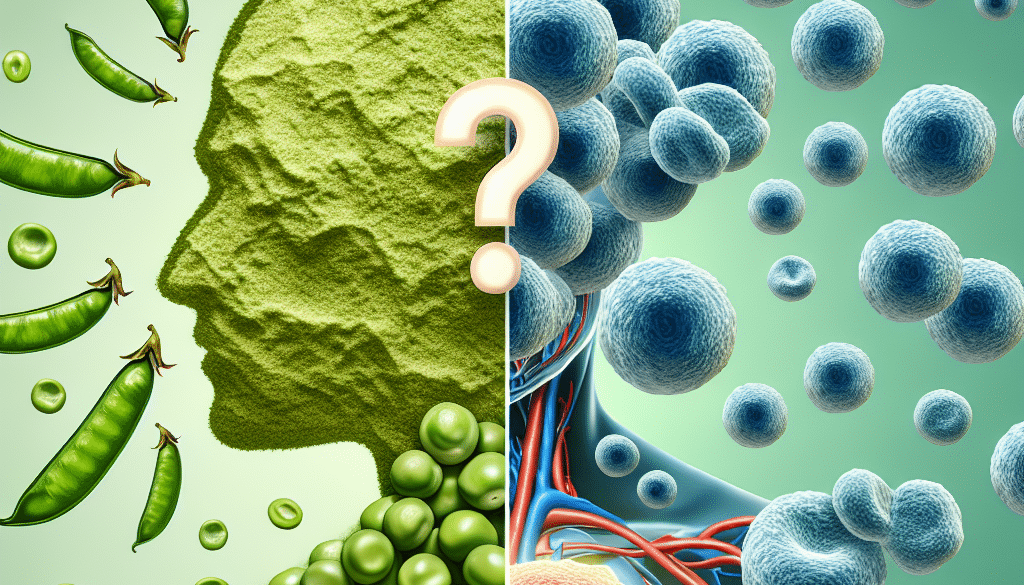Does Pea Protein Increase Inflammation? The Answer
Table of Contents
- Pea Protein and Inflammation: Uncovering the Truth
- Understanding Inflammation
- Pea Protein: An Overview
- Does Pea Protein Increase Inflammation?
- Research Findings
- Comparative Analysis with Other Proteins
- Additional Health Benefits of Pea Protein
- Case Studies and Anecdotal Evidence
- Conclusion: Pea Protein as an Anti-Inflammatory Protein Source
- Discover ETprotein’s Premium Pea Protein Products
Pea Protein and Inflammation: Uncovering the Truth

As the popularity of plant-based diets continues to rise, so does the demand for alternative protein sources. Pea protein has emerged as a favorite among health enthusiasts and those with dietary restrictions. However, with its rise in popularity, questions regarding its health implications have also surfaced. One such question is whether pea protein can increase inflammation in the body. This article delves into the scientific research surrounding pea protein and its effects on inflammation.
Understanding Inflammation
Inflammation is the body’s natural response to protect itself against harm. There are two types of inflammation: acute and chronic. Acute inflammation is the immediate, short-term response to an injury or infection, which is essential for healing. Chronic inflammation, on the other hand, is a prolonged inflammatory response that can contribute to various diseases, including heart disease, diabetes, and arthritis.
Pea Protein: An Overview
Pea protein is derived from yellow split peas and is a high-quality source of protein that contains all nine essential amino acids. It is particularly rich in branched-chain amino acids (BCAAs), which are crucial for muscle growth and repair. Pea protein is also hypoallergenic, making it a suitable option for those with allergies to dairy or soy.
Does Pea Protein Increase Inflammation?
The concern that pea protein might increase inflammation stems from the general skepticism surrounding high-protein diets and their potential impact on inflammatory markers. To address this concern, we must look at the available scientific evidence.
Research Findings
Several studies have investigated the effects of pea protein on inflammation. A study published in the Journal of the International Society of Sports Nutrition found that pea protein supplementation was just as effective as whey protein in promoting muscle thickness gains in athletes, with no adverse effects on inflammatory markers.
Another study in the journal Food & Function examined the impact of pea protein on inflammation and found that it had anti-inflammatory properties. This was attributed to the presence of bioactive peptides in pea protein, which can inhibit the production of pro-inflammatory cytokines.
Furthermore, a review in the British Journal of Nutrition highlighted that plant-based proteins, including pea protein, might have beneficial effects on inflammation due to their non-saturated fat content and the presence of phytonutrients with anti-inflammatory properties.
Comparative Analysis with Other Proteins
When compared to animal-based proteins, plant-based proteins like pea protein may have a more favorable impact on inflammation. Animal proteins can sometimes contain saturated fats and other components that may contribute to inflammation. In contrast, pea protein is naturally low in fat and does not contain cholesterol, making it a potentially better choice for those concerned about inflammation.
Additional Health Benefits of Pea Protein
Beyond its potential anti-inflammatory effects, pea protein offers several other health benefits:
- Heart Health: Pea protein may contribute to heart health by lowering high blood pressure and cholesterol levels.
- Weight Management: Its high protein content can promote satiety and help in weight management.
- Blood Sugar Control: Pea protein has a low glycemic index and may aid in blood sugar regulation.
- Digestive Health: Being naturally gluten-free and easy to digest, pea protein is gentle on the gut.
Case Studies and Anecdotal Evidence
While scientific studies are crucial, anecdotal evidence from individuals who have incorporated pea protein into their diets also supports its anti-inflammatory benefits. Many users report reduced joint pain and improved recovery after exercise, suggesting that pea protein may help mitigate inflammation-related symptoms.
Conclusion: Pea Protein as an Anti-Inflammatory Protein Source
In conclusion, the current body of research suggests that pea protein does not increase inflammation. On the contrary, it may have anti-inflammatory effects due to its unique composition of amino acids and bioactive peptides. Its plant-based nature, coupled with additional health benefits, makes pea protein an excellent choice for those looking to maintain a healthy, balanced diet.
Discover ETprotein’s Premium Pea Protein Products
If you’re interested in incorporating high-quality pea protein into your diet, ETprotein offers a range of organic and non-GMO pea protein products. Their pea protein is characterized by a neutral taste and allergen-free attributes, making it an ideal choice for various dietary needs. Whether you’re a fitness enthusiast, managing a health condition, or simply looking to improve your overall well-being, ETprotein’s pea protein can be a valuable addition to your nutrition regimen.
About ETprotein:
ETprotein, a reputable protein and L-(+)-Ergothioneine (EGT) Chinese factory manufacturer and supplier, is renowned for producing, stocking, exporting, and delivering the highest quality organic bulk vegan proteins and L-(+)-Ergothioneine. They include Organic rice protein, clear rice protein, pea protein, clear pea protein, watermelon seed protein, pumpkin seed protein, sunflower seed protein, mung bean protein, peanut protein, and L-(+)-Ergothioneine EGT Pharmaceutical grade, L-(+)-Ergothioneine EGT food grade, L-(+)-Ergothioneine EGT cosmetic grade, L-(+)-Ergothioneine EGT reference grade and L-(+)-Ergothioneine EGT standard. Their offerings, characterized by a neutral taste, non-GMO, allergen-free attributes, with L-(+)-Ergothioneine purity over 98%, 99%, cater to a diverse range of industries. They serve nutraceutical, pharmaceutical, cosmeceutical, veterinary, as well as food and beverage finished product distributors, traders, and manufacturers across Europe, USA, Canada, Australia, Thailand, Japan, Korea, Brazil, and Chile, among others.
ETprotein specialization includes exporting and delivering tailor-made protein powder and finished nutritional supplements. Their extensive product range covers sectors like Food and Beverage, Sports Nutrition, Weight Management, Dietary Supplements, Health and Wellness Products, and Infant Formula, ensuring comprehensive solutions to meet all your protein needs.
As a trusted company by leading global food and beverage brands and Fortune 500 companies, ETprotein reinforces China’s reputation in the global arena. For more information or to sample their products, please contact them and email sales(at)ETprotein.com today.














